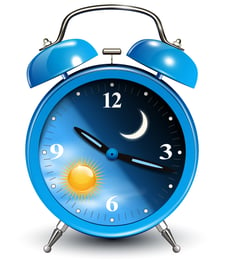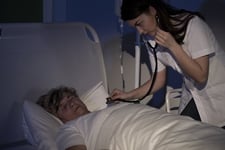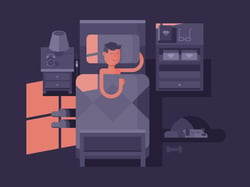 Restful sleep is important for the body, but If you work in the healthcare industry achieving it can be a battle.
Restful sleep is important for the body, but If you work in the healthcare industry achieving it can be a battle.
Sleep problems are common for many healthcare workers.
They are no strangers to working long, often unusual hours.
Working this way can be detrimental to health, especially when it comes to attaining regular, restful sleep.
The Importance of Sleep
Sleep is important to everyone’s health, but it can be more of a challenge for healthcare professionals with unusual or disruptive work schedules. Circadian rhythms—internal physical, mental and behavioral changes that follow a roughly 24-hour cycle—regulate the periods of sleep and wake throughout the day. They are negatively impacted by irregul ar work schedules.
ar work schedules.
In many ways, shift work disorder resembles the same (if temporary) misalignment of circadian rhythms that most people experience during the time changes in the fall and spring.
There are two types of sleep patterns. These are non-rapid eye movement (NREM) and rapid eye movement (REM).
During NREM sleep, a person experiences three stages ranging from a light to deep sleep.
Dreaming occurs once a person enters REM sleep. People typically cycle through the NREM-REM stages of sleep about every 90 minutes.
Why is this distinction important?
A decrease in REM sleep will negatively impact the quality of a person’s sleep at night causing fatigue during the day. Conversely, daytime fatigue contributes to an inability to sleep well at night.
During sleep, many healthcare workers may spend less time in the deep stages of sleep, or REM sleep when dreaming occurs, than in the lighter stages of sleep. This is caused by a lack of sufficient or quality sleeping brought on by working irregular shift schedules. Long term, this lack of good sleep can negatively affect a person’s ability to do his or her job well.
What is Shift Work Disorder?
Many times, these sleep disturbances can be attributed to shift work disorder. According to the American Academy of Sleep Medicine, the term “shift work” applies to the spectrum of nonstandard work schedules outside of the traditional "9 to 5" schedule that include rotating schedules, on-call, overnight work, or early morning hours.
 Shift work disorder (SWD) can look like insomnia, but should not be confused with it.
Shift work disorder (SWD) can look like insomnia, but should not be confused with it.
With shift work disorder, a person can have trouble staying asleep or even trouble falling asleep.
Shift work is very disruptive to sleep, leads to sleep deprivation, and is intolerable for many people.
Signs of shift work disorder include:
-
Excessive sleepiness
-
Lethargy or lack of energy
-
Insomnia or trouble falling asleep
-
Unrefreshing sleep
-
Difficulty concentrating
-
Irritability or depression
-
Trouble with personal relationships
Common Work Schedules That Lead to Shift Work Disorder
Certain shift schedules can exacerbate fatigue, limit rest, or increase stress. Healthcare professionals often sleep at unusual hours, but they are still expected to remain on high alert and make quick and important decisions while on the job.
Shift work disorders are especially dangerous for people who work:
-
The Overnight Shift. It is not uncommon for healthcare professionals to work overnight shifts; but working past midnight, even if it is only until 1 or 2 a.m.,
 will still cause disruption to circadian rhythms.
will still cause disruption to circadian rhythms. -
The Rotating Shift. Your body operates on a routine schedule. Working a rotating shift schedule, where your shift changes from week to week or even day to day, significantly disrupts this routine and is very hard on the body.
-
The Night Shift. Not only does working the night shift often lead to getting less sleep, it messes with the body’s internal rhythm making it very difficult for the body to adjust.
 Risks of Untreated Shift Work Disorder
Risks of Untreated Shift Work Disorder
There can be many barriers to a good night’s sleep. If those barriers aren’t resolved, shift work disorder will go untreated and can lead to more serious medical problems. The risks of untreated shift work disorder include:
-
Microsleep or the involuntary brief occurrence of falling asleep (especially while performing challenging tasks or operating machinery or a vehicle)
-
Impaired memory and ability to focus
-
Irritability and depression
-
Cognitive impairment, which can impact critical decision making
-
Sleepiness on the job
-
Decreased attention
-
Breakdown of the body’s metabolic process
-
Fatigue
Strategies for Treating Shift Work Disorder
There are potential health risks for those who work rotating or night shifts. Take a look at the following tips for treating, or at least finding some relief for, shift work disorder.
-
Make Shift Schedule Adjustments. If possible, avoid frequently working rotating shifts. You can also reduce the number of night shifts worked in a row.
-
Set a Regular Sleep Sch
 edule. Stick to a regular sleep-wake schedule as much as you can by sticking to a consistent sleep schedule.
edule. Stick to a regular sleep-wake schedule as much as you can by sticking to a consistent sleep schedule. -
Make sleep a priority. Get sleep when you can. Be sure to sleep before your shift and nap whenever you can.
-
Improve Your Sleep Environment. It is important to create a sleep environment conducive to restful sleep. This is known as practicing good sleep hygiene, and can be achieved by turning off all screens, TV and computer. Use blackout blinds and curtains to keep your bedroom dark, keep a cool room temperature, and block out noise.
-
Consult a Doctor. Due to the reasons for poor sleep varying, you should consult your doctor or healthcare provider with concerns, especially if you have had more than one automobile accident in the last month or have made critical mistakes while on the job: these are signs you are sleep deprived, likely from shift work disorder.
Other non-medical strategies for treating shift work disorder from the National Sleep Foundation include taking melatonin to induce drowsiness, light therapy to readjust your internal clock, implementing relaxation techniques, and ingesting caffeine to make you more alert during your shift.
Working irregular work schedules may be just a “normal part of the job;” however, everyone needs sufficient and refreshing sleep. Without it, not only is your mood and your job performance affected, your overall health is as well.

